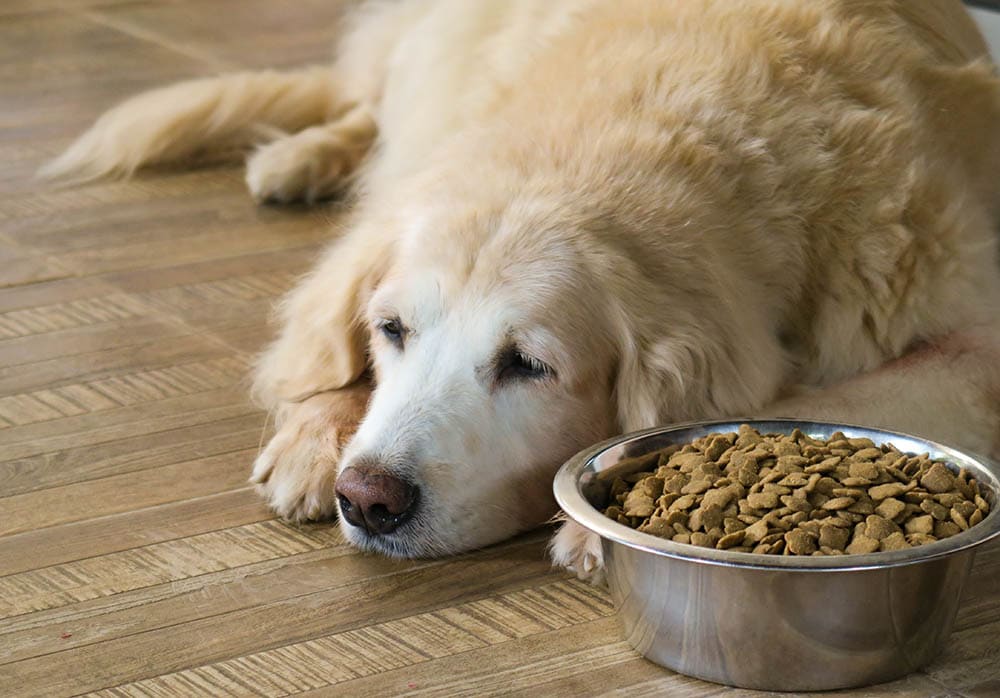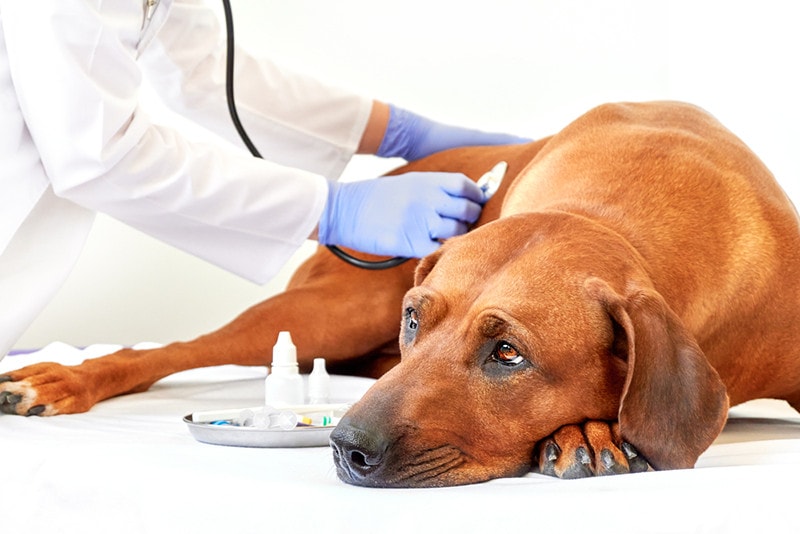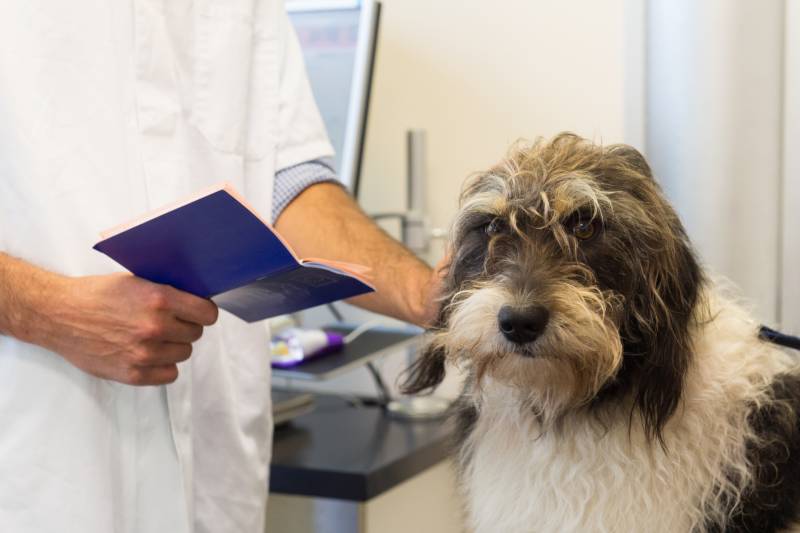There are plenty of things about owning pets that aren’t pleasant, from picking up their poop to cleaning up after their bouts of sickness. Waking up in the middle of the night to the sound of our canine best friend throwing up is never fun—for us or them—and can be one of the most worrying things about owning a dog.
A dog throwing up at night is a common issue, regardless of their breed, age, or sex, and the causes can range in severity. This list contains the potential reasons that your dog is throwing up at night, when you need to see a veterinarian, and how you can help your sick pup feel better.
Why Does My Dog Throw Up at Night? (5 Causes)
1. Bilious Vomiting Syndrome
Also known as reflux gastritis, bilious vomiting syndrome is one of the most common causes of a dog vomiting at night or in the early morning. If they frequently throw up bile—a yellow, watery substance—this is probably the reason. It’s caused by bile entering the stomach and causing irritation during the digestive process, especially on an empty stomach. While it can happen in dogs of any age, especially if they’re only fed once a day, it mostly affects older canines.
If there isn’t a more serious underlying health issue causing your dog’s night vomiting, this issue can be resolved by feeding your dog more frequent small meals. Sometimes giving them a handful of kibble before bed is enough to lessen their vomiting.
If changing their diet doesn’t work, though, talk to your veterinarian to see what can be done to help them.
2. Food Intolerance

Food allergies and food intolerance are often used interchangeably when it comes to issues that your dog might have with food, especially since they have similar symptoms. There is a big difference between these health problems, though. Allergies are a result of your dog’s immune system overreacting to something that they’ve come into contact with. Where food is concerned, it can be anything from peas to chicken.
Food intolerance, however, is a more accurate way of describing issues that aren’t caused by your dog’s overactive immune system. Among these adverse reactions, food poisoning is one of the biggest.
You have to make sure that your dog’s food is stored properly and that they don’t eat spoiled meat, especially if they tend to get into any trash bags when you’re not looking. While they might think that it’s a tasty treat, they can still suffer from vomiting and diarrhea if they ingest spoiled food.
3. Motion Sickness
Traveling with your dog can also be a cause of vomiting. Like humans, dogs can get motion sickness, especially if they’re not used to being in a car. Anxiety and the movement of the car itself can be reasons that your pup is feeling sick. This isn’t necessarily limited only to nighttime. Your dog can get carsick whenever you take them out for a drive.
You can help your pup get used to car trips by slowly desensitizing them to the vehicle before you take them for a drive. Sit with them in the car with the engine off, and slowly work up to turning the engine on, then taking short trips, and then longer drives. Keeping a window open can help too, especially in hot cars.
By making sure your dog enjoys the car ride, they’ll be less likely to be anxious enough to feel sick at all.
4. Obstruction

No matter how old they are or their breed, dogs are curious creatures. Since they don’t have hands, they use their mouths to explore things that they’re interested in, which can lead to accidentally swallowed objects. They can also suffer from pica, a condition where they crave and eat non-food items that can get stuck in their digestive system.
Vomiting can be caused by a blockage in your dog’s digestive system, along with constipation, straining to poop, behavioral changes, diarrhea, abdominal pain, and lethargy.
This isn’t something that you can treat at home. If you catch your dog eating something that they shouldn’t and they start to show these signs, you must take them to a veterinarian. Most of the time, surgery is required to fix the issue.
5. Stomach Upset
Another common reason for your dog puking at night is an upset stomach. Both food intolerance and obstruction can cause your dog to have an upset stomach, but it can also be caused by several other things. Medication side effects, bloat, dietary changes, parvovirus, intestinal parasites, and pancreatitis are a few of the major causes.
Sometimes, stomach upset can go away on its own. Stress-related stomach upset, for example, can be soothed by reassuring your dog and keeping their routine as stable as possible. However, in some cases, veterinary intervention is required. Bloat, ingestion of toxic substances, reactions to medication, and kidney or liver failure all require a trip to your veterinarian.
What’s the Difference Between Vomiting and Regurgitation?
Recognizing the difference between vomiting and regurgitation is an important distinction to make if you want to help your dog. It’ll also help you determine whether your dog requires medical assistance.

Regurgitation
Unlike vomiting, regurgitation usually occurs immediately after your dog has eaten. It’s also less taxing on your dog’s body, with no abdominal contractions. Usually, it’s a result of an issue with your dog’s esophagus rather than farther along in your dog’s digestive system. Due to this, the food never made it to your dog’s stomach, so it is often undigested.
- Eating too fast or too much
- Throat problems
- Congenital problems
- Cancer, foreign bodies, rabies, poisoning, and myopathy
- Esophageal disease
Vomiting
Where regurgitation is somewhat effortless, vomiting is more strenuous on your dog. Not only can your dog feel nauseated and restless, but they can also suffer from muscle contractions in their abdomen. It can be a pretty uncomfortable situation for your dog.
Most of the time, cases of acute vomiting go away on their own within a few hours. However, chronic vomiting, or vomiting that lasts for longer than 24 hours, suggests the presence of an underlying health issue. In this case, it’s best to visit a veterinarian for a proper diagnosis.
What to Do If Your Dog Vomits
Taking care of your dog when they vomit isn’t as simple as cleaning it up and going back to bed. While some cases of vomiting don’t require much interference, there are a few signs to look out for that can suggest a more serious underlying condition.
Here are a few things to consider when cleaning up after your sick dog.
- ADVANCED ENZYMATIC CLEANER - Penetrates the most stubborn smells and stains at the deepest molecular...
- FOR ANY MESS, ON ANY SURFACE - This pet odor eliminator cleans your carpets, floors, furniture,...
- FRESH, NATURAL ODOR - Our unique formulation doesn't rely on dangerous or unpleasant chemical...
If your house smells like you have a dog, it's time to try out the Hepper Advanced Bio-Enzyme Pet Stain & Odor Eliminator Spray! This amazing product removes even the most stubborn stains and odors, and it comes with a 100% satisfaction guarantee. Click here to learn more about this wonderful product.
At Dogster, we’ve admired Hepper for many years, and decided to take a controlling ownership interest so that we could benefit from the outstanding products of this cool pet company!
Appearance
Vomit is one thing that everyone would rather scoop up and ignore, but the appearance of your dog’s puke can give you key insight into why they’re having problems.
Yellow, foamy, or liquid-like vomit mostly contains bile and is often a result of reflux gastritis and an empty stomach. Green vomit can also be caused by this, along with the ingestion of grass. This type of vomiting can often be rectified by feeding your dog more often but may require treatment from a veterinarian.
Large infestations of worms can frequently cause vomiting, and they will appear in your dog’s vomit. If you see this, speak with your veterinarian about deworming treatment.
Another serious concern when it comes to your dog’s vomit is the sight of blood. The amount can vary, though, and a pink tinge might not be the sign of a serious issue, provided that it doesn’t progress further. But fresh blood, clots, or a coffee-ground appearance can all signal bleeding in your dog’s digestive system. If you see any of these signs, you’ll need to contact your veterinarian.

Frequency
Dogs eat many things that can give them an upset stomach and lead to vomiting. Sometimes, these issues go away on their own once whatever set them off passes through their system. This is why it’s important to pay attention to how often they vomit.
If it’s a one-off and they’re still acting normal, it’s likely just your dog expelling something that didn’t agree with them. Vomiting that lasts longer than 24 hours or is accompanied by other signs—like lethargy, blood, diarrhea, or dehydration—is more serious.
Age
The age of your dog can also affect how serious the vomiting is. Puppies—which are at greater risk of dehydration and hypoglycemia—and geriatric dogs should both be taken to a veterinarian.
Conclusion
Your dog vomiting at night isn’t always a sign of a serious health issue. If your dog throws up bile, it can often be caused by an empty stomach and be alleviated by feeding your dog smaller meals more often. Frequent vomiting, the appearance of blood, or the presence of other signs can suggest a much more serious issue, though.
Pay attention to the appearance of your dog’s vomit and how your pup is behaving to determine whether you need to visit a veterinarian or if it’ll pass on its own.
See Also:
Featured Image Credit: Taisya Korchak, Shutterstock














